-
SUMMER NIGHTS (Ohad Milstein 2021)
OHAD MILSTEIN: SUMMER NIGHTS (2021)
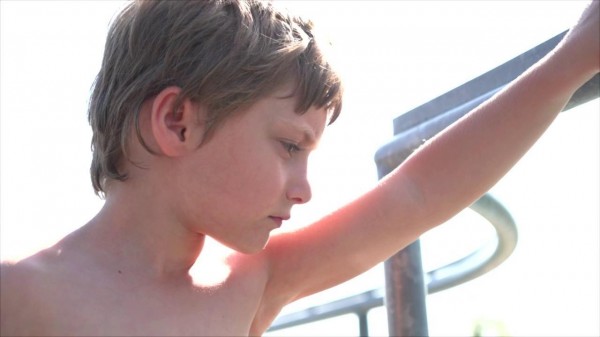
ALVA IN SUMMER NIGHTS
A prize-winning Israeli documentary in which a father explores the point of view of his six-year-old son, with reference to his own father
Hate to be a complainer but the only thing that's wrong with this little documentary is that it's too perfect. The filmmaker Ohad Milstein creates wonderful purity where nothing unnecessary intervenes. But this truly, clearly, is a very safe environment for the six-year-old Alva. This is a picture of six-year-old Alva, an Israeli boy who speaks Hebrew to his father and grandfather and French to his Swiss mother. The film witnesses moments in Alva's life in the summer before he goes off to his first school.
This is a prize-winning short film and so it is well constructed. The shape comes from moments: Alva asking his father about aging and, by implication (but skirted), death. A haircut by the father for the boy and similarly one by the father for his own father, who is less satisfied. Alva dancing in colorful tights; swimming; standing on a high diving board; running. In a whispered voiceover he talks about his fear of heights, but he comes off as graceful, athletic, physically well developed for his age. During an interlude in Bern, Switzerland, he also woos a girl his own age - without much luck, though. He offers her white chocolate which she won't take. "It's chocolate!" he says. Enough said.
Actually this may be more than anything about Ohad, the father's, relationship with his son. Hence also it takes time for Ohad to talk to his father, at first portly but athletic on the beach, discussing whether they ever had searching conversations when Ohad was small, as Ohad is having with Alva. That these conversations, because at night, are whispered not to awaken his little sister, makes them seem all the more magical. They did not have such conversations, or almost never. So we have the old theme of the son who tries to have with his son the intimacy and love he didn't have with his own father. Those magical whispered conversations between Alva and Ohad do contain declarations of love, and promises always to be there to help and support, to hug and kiss, but Alva decides he will do this, the hugging and kissing of his father, till he's 35, and no longer.
Time spent by Alva with his mother, in French, is spent more talking about school, assembling colored pencils, and a pencil case that delights Alva. It's as if French is for practical academic matters and courtship, while Hebrew (as is only fitting?) is for talking about love and death, God and the passage of time. "Do you believe in God, dad?" Alva asks. There is a nice irony in the way Ohad and his father discuss whether he should tell Alva the truth and he says yes, and not to say the stork brings babies, and then near the end when Alva asks where babies come from his father says the stork brings them, and Alva, saying "What stork, father?" seems to know that's a silly fiction.
A further development of the sub-theme of the grandfather is said elder's keeping his father's photo in a drawer all these years, and, chided by a discussion with Ohad, bringing it out to frame and hang on his wall at last. He, son and grandson and nephew of carpenters, he says, tries to make a frame for his father's photo helped by Alva, and badly botches the job. He takes the photo to a framer, and hangs the framed photo as we watch (i's dotted, t's crossed). But the mess of a job becomes a subject of joyous laughter for granddad and Alva. There is no shame, no pain; acceptance.
I probably long for a touch of imperfection, a moment of real awkwardness or tears. But this is simply a perfect film about a perfect boy, and a perfect age of curiosity, purity, and sweetness - and readiness to love. The neat shape of the film is that it's a long recollection about a summer. It reminds one of a more perfect, more complex film about the same age, or ages close to Alva's, Nicholas Philibert's amazing 2002 documentary about a French mountain country elementary school with a single dedicated teacher, To Be and to Have/Être et avoir. Where this film ends, that one begins.
Summer Nights, 53 mins., debuted Jul. 2, 2021 at Tel Aviv's Docaviv festival, where it won a best film award; also shown at Bologna Biografilm Festival. Screened for this review as part of the San Francisco Jewish Film Festival, July 21-Aug. 7, 2022.
Schedule
Thursday July 28, 2022
6:00 p.m.
Albany Twin
Last edited by Chris Knipp; 07-27-2022 at 05:54 PM.
-
THE RESTLESS HUNGARIAN (Tom Weidlinger 2021)
TOM WEIDLINGER: THE RESTLESS HUNGARIAN (2021)

PAUL WEIDLINGER (RIGHT) IN THE RESTLESS HUNGARIAN
TRAILER
Weidlinger's exploration of his father is detailed yet unsatisfying
This film is based on Tom Weidlinger's book exploring the life and work of his father, The Restless Hungarian: Modernism, Madness, and the American Dream (2019). The film makes one think of Nathanial Kahn's wonderful Oscar-nominated My Architect: A Son's Journey,(2003) . Two great, distant fathers in the field of architecture, pursued in documentary films by their sons. But the latter is more successful and more moving as a film. Louis Kahn was a truly great architect, the son's filmmaking pursuit of him is touching and real, and the end of his film explores his father's monumental, transcendent work and finishes on a note of exultation, even joy. And Nathanial was illegitimate, the fruit of another, secret union. Whatever we may think of him as a man, Louis Kahn inspires awe as an architect, an artist: we can feel happy that Nathanial was able to connect with him in this beautiful way. Tom Weidlinger is doing something different, exhaustively exploring his father's life, connections, secrets, and his father Paul, though Tom says he is "famous," is certainly significant and highly accomplished but his life lacks that significant shape of pursuing a unique artistic vision. And while his son wants to admire him he has reason not to like him. Paul Weidlinger was a cold, difficult man who pursued some dubious projects, working for decades on designs for protective silos for nuclear missiles that were never built, while part of the Rand Corporation, which Daniel Ellsberg, once allied with it himself, describes as a "doomsday cult" in an interview for this film.
In fact Paul Weidlinger seems to have gone wrong several times. The first surprise discovery for Tom is that his father was Jewish, though I'm not sure exactly how this could have escaped his son. But this is something that happened sometimes: that Jews who had a horrible time escaping the Nazis chose to conceal their Jewishness thereafter. It seems a mistake that Paul left Bolivia, where he and his French Swiss wife Madeleine found refuge, or he did and she joined him (she was not Jewish; she was just going to become schizophrenic). He was so happy and successful there, as the film tells it, and instantly rich because qualified engineers were so in demand. Instead he chose to immigrate to the US, where he became the structural engineer for buildings designed by some major architects and major sculptures by Picasso and Dubuffet (it's appealing that he had a penchant for Dubuffet and was part of the Bauhaus). At some point Madeleine manifested her schizophrenia unmistakably and went into a clinic so expansive Paul had to found a business to raise the money to pay for her treatment there. They gave Madeleine insulin and electric shock treatments that she said were horrible. Maybe if he had not decided to marry her before he had even met her, he might have chosen more wisely.
Another mistake is that he seriously discounted Tom's older sister, Michelle, who later killed herself and her young child, for which Paul held himself responsible, as he says in an earlier filmed interview by Tom made when in his eighties, excerpted here. When Tom was born Paul was delighted to have a son, and made her insignificance obvious to Michelle. But since Tom tells of being suicidal at several times, including quite recently, his relative favor may not have greatly benefitted him. He seems to have been aware of his father's doomsday nuclear activities at a time when he was a longhaired youth listening to Bob Dylan's "Masters of War."
But while Paul Weidlinger's life as explored here is an unsatisfying mixture, the film is nonetheless a review of a large slice of the twentieth century. And as if to compensate for its subject's failings, and as befits a filmmaker who has numerous docs under his belt, re[s a rich and often entertaining amalgam of documents, some of them shot by Madeleine, who early on always had a Leica in hand, and seems to have shot film footage of the family as well, though those are mostly reenactments shot by Tom. Reenactments always fill one with misgivings and uncertainty, but one can't say they're not well done.
Paul's early life is dramatic and fascinating: his upper middle class origins, mixed success at school, his communist activity, leading to a barely escaped death sentence; his identification with the Bauhaus; then his struggle to live through the thirties as a Jew and escape the war. And then Bolivia, with Tom's vivid recreation of the ocean voyage there amid a great crowd of interesting, very lucky refugees who are going to escape the war and the Holocaust. But in the end, though Tom Weidlinger has pursued his father so energetically, we are left depressed by the downers of the personal life and disappointed by the rather slapdash review of Paul's biggest projects - the contrast is so clear with the lingering, noble visit to Louis Kahn’s Sher-e-Bangla Nagar, Dhaka, Bangladesh buildings at the end of Nathanial Kahn's My Architect.
The Restless Hungarian, 105 mins., was screened for this review as part of the San Francisco Jewish Film Festival, July 15-Aug. 7, 2022.
Schedule
Friday July 29, 2022
3:05 p.m.
Albany Twin
Last edited by Chris Knipp; 07-29-2022 at 12:00 AM.
-
TAKE THE 'A' TRAIN (Yair Asher, Itamar Lapid 2021)
YAIR ASHER, ITAMAR LAPID: TAKE THE 'A' TRAIN (2021)
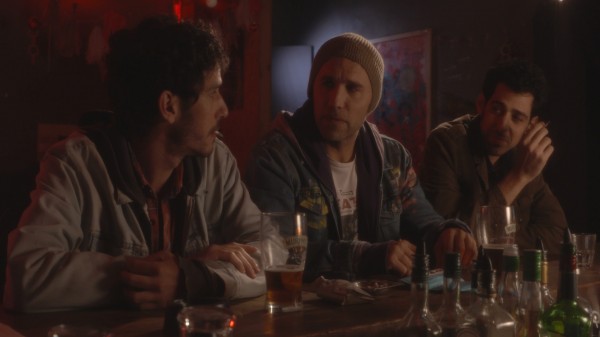
YUVAL ORON, LEFT, AND YAKIR PORTAL, RIGHT, IN TAKE THE 'A' TRAIN
A vivid look at Israel's current generation of late-twenties, early-thirties urban slackers.
The focus is on Yishai (Yakir Portal), a jazz pianist who now lives in Paris (with classical chops, which he shows off) who suddenly turns up back in his native Tel Aviv, reconnecting with his middle-class parents who live there, his leftist dad (Alon Olearchik) and young-looking, loving mother (Anat Atzmon), and with his slacker younger brother Omer (Yuval Oron). The two tall, long-faced young men look almost like twins. They both play basketball, party, drink, smoke, listen to recorded music, make out with women who leave early, party all night. What's up? Directors Asher and Lapid seem more into atmosphere than story. They know their milieu, the film is appropriately cast, the sometimes shaky handheld camera is fluid. Tech specs are minimal, story arc rambling; this will appeal to those whom it's about, and may leave others cold. It is not a happy picture of the coming generation of Israeli adults.
Yishai's situation back in Paris remains rather mysterious. He has a group and gigs waiting for him thre. He talks to a bandmate, a girlfriend or ex, not exactly saying where he is. What there is comes through the interaction of Yeshai and Omer. The parents are concerned that Omer has dropped out of university, which he says is a bunch of has-been oldsters (he seems not to have connected with the students). His pals are partly musicians too, so Yishai connects with them; he also connects with women he knows, and an old girlfriend, who is free and horny, but has a horrible roommate she has gotten stuck with who plays his music so loud they can't have sex. They drive to a bad part of town; she rejects his suggestion of a hotel room as too expensive. But their effort at car sex is thwarted by a creepy peeper.
In one scene Yishai has persuaded Omer to come to have dinner at their parents' with some older adults. A hot debate over politics breaks out: this is no easygoing social event. Omer gets into a verbal fight with their parents and leaves before their mother brings desert, but we see them driving together next; another party.
Yishai interacts with Omer's mates, one of whom is on the verge of a breakup. There is a fight over a new leather sofa. Yishai proposes that Omer come to Paris with him and share his flat, saying he can stay a long time, it will be easy to get a job, it will be great. Omer suggests to a girl at a party that she go to Guatemala with him. She says she can't: she's just gotten a job.
At the end of this film there is some suspense because the brothers seem so impulsive and lacking in interiority or clear committment we do not know if Omer will go to Paris or Yishai, who has said his return flight is tomorrow, will for some reason decide to stay in Tel Aviv and give up the life in Paris he keeps saying is fine (maybe it isn't?). At the end, Omer drives Yishai to the station at 6 a.m. to catch the train to the airport. We leave them sitting there by the track as the train is apparently about to arrive. The uncertainty remains, though this is hardly a storytelling coup. Yair Asher and Itamar Lapid seem even at the end ready to tell a story but not to have begun it yet. It's in the station, but the train hasn't come yet. Nadav Lapid or Samuel Maoz these directors are not. But they presumably represent a younger generation and will have new things to say.
Take the 'A' Train, 103 mins., debuted at Jerusalem Aug. 2021 (nominated for a best feature award). Screened for this review as part of the San Francisco Jewish Film Festival of July 15-Aug. 7, 2022.
Schedule
Friday July 29, 2022
8:45 p.m.
Albany Twin, Albany CA
Last edited by Chris Knipp; 07-31-2022 at 09:49 AM.
-
SIMCHAS AND SORROWS ( Genevieve Adams 2022)
GENEVIEVE ADAMS: SIMCHAS AND SORROWS (2022)
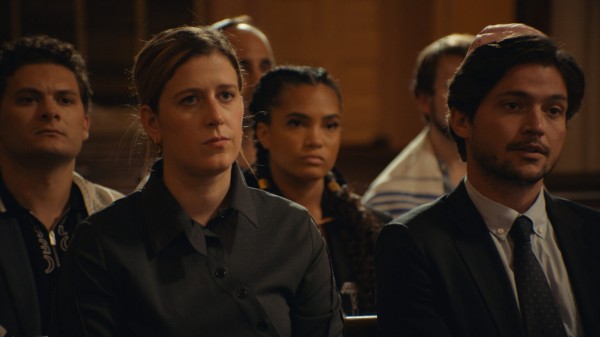
GENEVIEVE ADAMS, THOMAS MCDONELL IN SIMMCHAS AND SORROWS
In an ambitious directorial debut, Genevieve Adams references her own experience of marriage into a Jewish family
Genevieve Adams has made a semi-autobiographical film about Agnes (writer-director Genevieve Adams), a young pregnant Catholic-raised, now atheist woman who, with her fiancee Levi (Thomas McDonell), enrolls in a Judaism class taught by progressive, feminist Rabbi Cohen (Hari Nef, "Assassination Nation") in order to convert to his faith and satisfy his family. Adams went through something like this experience herself, and evidently came through it happily. Her film is humorous, but never bitter, even if the humor doesn't always come off. Agnes' family is represented here through a grandfather who raised her, played by 92-year-old two-time Tony winner John Cullum. Adams had no trouble playing pregnant since she was.
Adams, who is relaxed, and McDonell, who is good humored, are fine in every scene where they're together enacting their sometimes conflictual relationship (celebrating Christmas as an ethnic holiday becomes a sticking point). Some of the times in the rest of this movie are less successful. The setting is Williamsburg, Brooklyn and Manhattan and not for the first time I thought of the great HBO series "High Maintenance," whose scenes and locations are similar, and wished for some of that wit, specificity, and lightness of touch.
Agnes teaches a class for little kids. Having them talk like sophisticated adults have worked if children had been found who could recite such lines convincingly and understandably. Scenes with Cullum as the grandfather and Broadway vet Chip Zien as Agnes' prospective father-in-law ought to have flowed more seamlessly and with a surer tone.
Obviously there are simply flaws in Genevieve Adams's writing, which is rife with non-sequitur and overly explanatory moments; and in her direction and the editing;, which don't always find a smooth rhythm. This issue is notable in the Judaism class where neither the writing nor the delivery of Hari Nef as the rabbi feels quite right. Trimming would have helped the script.
But one supposes those who identify with this experience or are looking for a way to relate to it may find moments of satisfaction.
Simchas and Sorrows, 117 mins., debuted at Cinequest (San Jose/Redwood City) Apr. 7, 2022, and was screened for this review as part of the San Francisco Jewish Film Festival (July 15-August 7, 2022). The film was shown Fri., Jul. 22, 2022, 5:30 pm at the Castro Theater.
Last edited by Chris Knipp; 07-31-2022 at 09:23 AM.
-
REPAIRING THE WORLD: STORIES FROM THE TREE OF LIFE (Patrice O'Neill 2022)
PATRICE O'NEILL: REPAIRING THE WORLD: STORIES FROM THE TREE OF LIFE (2022)
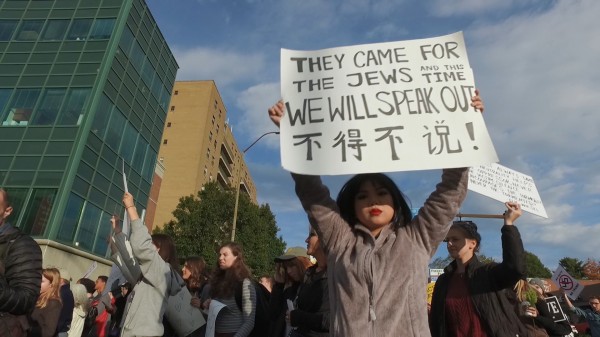
DEMONSTRATION SHOWN IN REPAIRING THE WORLD
The 2018 Pittsburgh anti-Semitic massacre: a film about community response
Pittsburgh is "small," this film says; and the city's solidarity was great after the October 27, 2018 massacre of 11 Jewish worshippers (including a 97-year-old woman) at the Tree of Life Synagogue, the worst anti-Semitic attack in US history. There was an immediate outpouring of support across communities. It may have helped that the Squirrel Hill neighborhood where this happened is a particularly friendly one. It is also one with a strong Jewish element and the city is very segregated and yet "there is a level of unity and solidarity here that there isn't in other cities", says Wasi Mohamed, then Islamic Center director, who raised close to $1/4 million to help victims. This is an energetic and dedicated documentary that represents three years of work by director Patrice O'Neill, who has previously focused on attacks of this kind in her films. Here especially there has been a coming together. The ongoing collective action chronicled in O'Neill's film is a dramatic, wide and touching interpretation of the Jewish concept of "tikkun olam," repairing the world.
The accused (unnamed here, who pleaded not guilty and is still awaiting trial) is a white supremacist. This movement has grown greatly in recent years; clearly, Donald Trump tacitly supported it (and still does). Hence the new connection of the Black community with the Jewish community, also the Muslim community - great multi-ethnic, multi-religion unity developed.
But: there are white suprematists in Pittsburgh, and their threats nation-wide have abounded. Always they increase after a major incident like the Tree of Life massacre. Furthermore, a wide pro-gun coalition exists throughout the country. New Pittsburgh restrictions on the use of assault weapons in the wake of the Tree of Life attack were later struck down by the court as violating Pennsylvania gun laws.
Brad Orsini, director of security for the Jewish Federation of Greater Pittsburgh; appears here as one who, through the 2018 event, came to a greater understanding of what it would be like to be a member of a minority that is an object of hate crimes.
The Poway synagogue shooting of April 27, 2019 near San Diego, California, which saw one killed and three injured, again caused a gathering of Pittsburgh community figures covered in this film. Likewise August 3, 2019, when a gunman killed 23 in a Walmart in El Paso, Texas; the shooter is one who believes there is a Hispanic invasion in Texas. as local Hispanic hate crime representative explains. This upsurge of racist and anti-Semitic violence in the US following the Tree of Life attack has brought Pittsburghers continually closer together, as the film shows. Efforts show in the film in meet-ups across sectarian lines at the community level and meetings and classes in high schools. Three years after the 2018 attack, Pittsburgh reached out to the world, hosting the Inaugural Eradicate Hate Global Summit, an international conference on hate.
A conventional film in form, this is nonetheless an impressive enough one for its coverage of trauma and community response. O'Neill has made a real effort to represent all elements of the community. Patrice O'Neill is a leader of Not in Our Town, a movement to build hate-free communities across the country.
Repairing the World: Stories from the Tree of Life, 90 mins., debuted at the Pittsburgh JFilm Festival on May 5, 2022 and won the best documentary audience award at the festival. It was screened for this review as part of the San Francisco Jewish Film Festival, July 15-August 7, 2022. West Coast Premiere.
Schedule
Sunday July 31, 2022
2:00 p.m.
Albany Twin
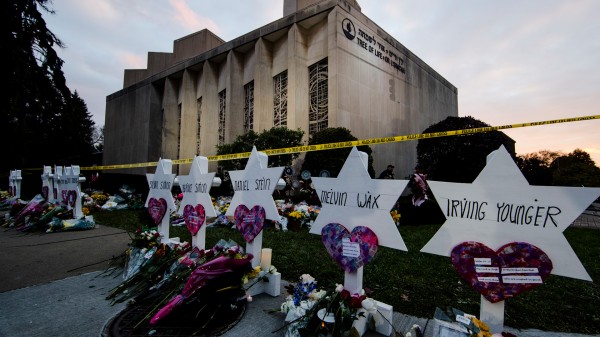
IN FRONT OF THE TREE OF LIFE SYNOGOGUE IN REPAIRING THE WORLD
Last edited by Chris Knipp; 07-31-2022 at 09:10 AM.
-
MORE THAN I DESERVE (Pini Tavger 2021)
PINI TAVGER: MORE THAN I DESERVE (2021)
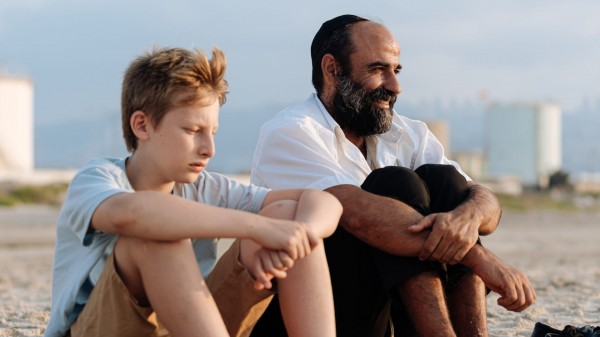
MICHA PRUDOVSKY, YAAKOV ZADA DANIEL IN MORE THAN I DESERVE
The complicated life of a poor Ukrainian boy in Israel who wants a Bar Mitzvah
Pini Tavger is a gifted filmmaker who has honed his skills with a number of shorts, and this feature debut, which he wrote and directed, winning the best screenplay award at the Jerusalem Festival, is a vivid and intense slice of life. A boy's life. A poor boy from Ukraine who immigrated to Israel with his single mom, who's got more than one strike against him, but is a fighter. He even tackles a big bully on the soccer field of his working class neighborhood and subdues him; and, at least at first, he has jumped in as goalie and gotten high praise.
Pinchas (Micha Prudovsky) is a slight strawberry blond thirteen-year-old. The soccer boys call him "Pinkie." He sees neighborhood boys being coached for their Bar Mitzvahs and he wants in. The portrait of his mother, Tamara (Ana Dubrovitzki), isn't sympathetic. Why is the movie so hard on her? She gathers some sympathy later, but not much. She is a single mom, she works nights at a hospital, she's a lousy cook, and she is sleeping with a married man called Yossi (Udi Razzin) and it's not going to work. She and her son speak Ukrainian, but they also speak Hebrew. We don't know how long they have been in Israel but the living room has a tall pile of cartons with stuff yet unpacked.
The man giving the Bat Mitzvah preparation, who lives nearby, is Shimon (Yaakov Zada Daniel) who's a Chabadnik, the Israeli sources tell us, and he develops a personal relationship with Pinchas, teaching the boy he is named after a great Jewish hero. In a quiet way, Pinchas does well with the recitations, good at cadences because he's rather musical. But also, it develops, perhaps Shimon connects with Pinchas' outsider status, because it turns out he is recovering from an extremely dissolute youth in which he used all kinds of drugs, was an addict, was a Don Juan, and had a band. Such problems!
All this is before Shimon and Tamara start to notice each other and Shimon takes the place of Yossi. Pinchas did not like Yossi, but he can't very well like his Bat Mitzvah coach sleeping with his mother. This might seem an absurd mess of plot twists except that this movie has an easy naturalness and simplicity about its style that draws you in, even as it depresses you,. And as Pinchas, young Prudovsky has a blond, smooth, neutral coolness that is quite appealing: he has the subtle durability of the picaresque hero, or anti-hero. Since we don't see him at school we are left to assume that while it's not great for Pinchas, it's doable - or he would not have the energy left over for his attempts at entering the neighborhood soccer game.
Meanwhile Shimon's home life has emerged:. He lives with his parents. He has been told he must marry:. He won't get that synagogue position he wants unless he accepts a proper wife. But he wants a woman he loves even if he knows that is "More than I deserve." What his parents will not allow is for Shimon to shack up with Tamara: nix on that! They tell her. Yet there is time for a sequence at the sea with the three of them, Tamara diving in clothed, then Shimon and Pinchas stripping down and diving in too. There is also a sequence where the atheistic Tamara, partly loving Pinchas, partly hoping naively to please Shimon, makes an effort to go through a purification ritual and achieve a DIY Kosher kitchen. On the one hand we glimpse a fringe of makeshift Jewish orthodoxy, as it such a contradiction in terms were possible. On the other hand we see an orthodox misfit holding out for a woman he loves, recalling Akiva, the chasidic hottie protagonist of the Israeli television series "Shtisel."
We sense that Pinchas is a powerless observer of much of his own life. But even at the disenchanted end, we see that he has coping skills that won't quit. This is most of all his portrait, and it has the neat composure of a well-made short story; hence we understand why Tavger received the best screenplay award. More Than I Deserve is very, very bittersweet story of marginal Israeli life by a promising filmmaker that reminded me of Haim Tabakman's astonishing 2009 film Eyes Wide Open.
More Than I Deserve, 82 mins., debuted at Jerusalem Aug 27, 2021, winning the best screenplay prize. Tavger, who wrote and directed, has made a number of shorts on related subjects. This is his feature debut. Screened for this review as part of the San Francisco Jewish Film Festival, July 15-Aug. 7, 2022.
SFJFF SHOWTIMES:
Saturday July 30, 2022
8:45 p.m.
Albany Twin
Monday August 1, 2022
12:01 a.m.
JFI Digital Screening Room
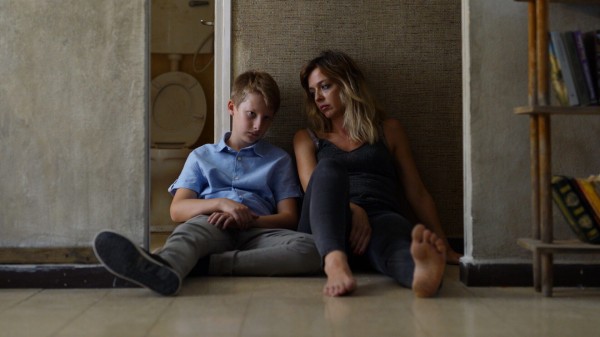
MICHA PRUDOVSKY, ANA DUBROVITZKI IN MORE THAN I DESERVE
Last edited by Chris Knipp; 07-31-2022 at 08:39 AM.
 Posting Permissions
Posting Permissions
- You may not post new threads
- You may not post replies
- You may not post attachments
- You may not edit your posts
-
Forum Rules





 Reply With Quote
Reply With Quote







Bookmarks